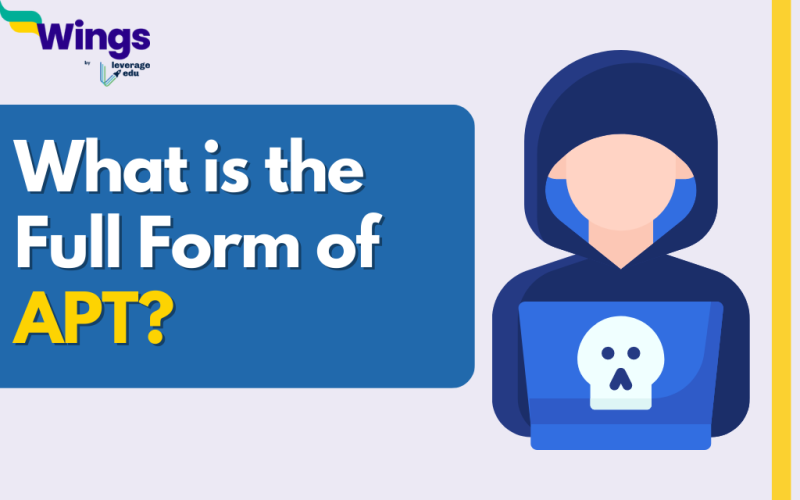APT Full Form: APT stands for Advanced Persistent Threat. An Advanced Persistent Threat (APT) is a targeted cyberattack that lasts for a long time and involves an intrusion into a network that goes unnoticed for a considerable amount of time.
APT attacks are started to steal data rather than harm the network of the target organisation.
Instead of attempting to enter and exit the targeted network as fast as possible, the majority of APT attacks aim to gain and keep continuing access to it. Hackers frequently choose high-value targets, such as nation-states and major organisations, to collect information over an extended period because APT attacks can require a lot of time and money.
How Does an APT Work?
Table of Contents [show]
Attackers who carry out APTs often follow these sequential steps to get and keep access to a target:
- Obtain entry: APT groups access a target by attacking internet-connected systems. Usually through spear phishing emails or a flaw in an application, the goal is to get access to the target and infect it with malicious software.
- Gain a foothold: Threat actors exploit their access to the target after they have done so to conduct additional reconnaissance. They build networks of backdoors and tunnels to move around covertly using the malware they have installed.
- Gain deeper access: APT actors may employ techniques like password cracking to get administrator rights once they have entered the targeted network.
- Laterally move: Threat actors can freely travel throughout the company network once they have compromised their target computers, even obtaining administrator rights.
- Set up the attack: To exfiltrate the data, the hackers now centralise, encrypt, and compress it.
- Steal the information: The data is collected by the attackers, who then move it to their system.
- Stay put until they are found. Cybercriminals have two options: either they build a backdoor so they can access the system later or they repeat this practice for extended periods until they are discovered.
Examples of APT
APTs are typically given names by the researchers who first identified them, though many advanced persistent threat assaults have been identified by many researchers, therefore some have more than one name.
Some examples of APT (full form Advanced Persistent Threat) are:
- The Sykipot APT malware family
- The GhostNet cyberespionage operation
- The Stuxnet worm
- APT28
- APT29
- APT34
- APT37
How to Detect an APT?
Advanced persistent threats are often difficult to detect, although they do exhibit some warning indications. An organisation may experience the following symptoms after becoming the target of an APT:
- Strange or unusual database activity,
- A sudden increase in database operations involving massive amounts of data, unusual user account activity,
- Extensive use of backdoor Trojan horse malware, which allows APTs to maintain access,
- The presence of unusual data files, which may indicate data that has been bundled into files to aid in the exfiltration process
Other APT Full Form
| Full Form | Category |
| Automatically Programmed Tool | Networking |
| Annotation Processing Tool | Softwares |
| Almost Plain Text | Softwares |
| Advanced Packaging Tool | Softwares |
| Advanced Package Tool | Softwares |
| Adaptive Performance Technology | Softwares |
| ANAPARTI | Indian Railway Station |
| Audio Pass Through | Electronics |
| Advanced Pointer Telemetry | Space Science |
| Appointment, Promotion, and Tenure | Job Title |
| Administrative, Professional, and Technical | Job Title |
| Jasper (tn) | Airport Code |
| Auto-placement Technology | Database Management |
| Advanced Positioning Technology | Technology |
| Adaptive Prediction Tree | Maths |
| Almost Polynomial Time | Maths |
| Australasia Pacific Thrust | Earth Science |
| Advanced Plume Treatment | Earth Science |
| Analytic Perturbation Theory | Physics Related |
| Apartment | Real Estate |
| Asset Protection Trust | Stock Exchange |
| Automated Pit Trading System | Stock Exchange |
| Arbitrage Pricing Theory | Stock Exchange |
| Association of Professional Tossers | Sports |
| Advanced Platform Technology | Military and Defence |
Must Read: What is the Full Form of BASIC?
Must Read: What is the Full Form of SCB?
This was all about APT Full Form. Visit the General Knowledge page to discover more intriguing articles like these.
 One app for all your study abroad needs
One app for all your study abroad needs















 45,000+ students trusted us with their dreams. Take the first step today!
45,000+ students trusted us with their dreams. Take the first step today!
